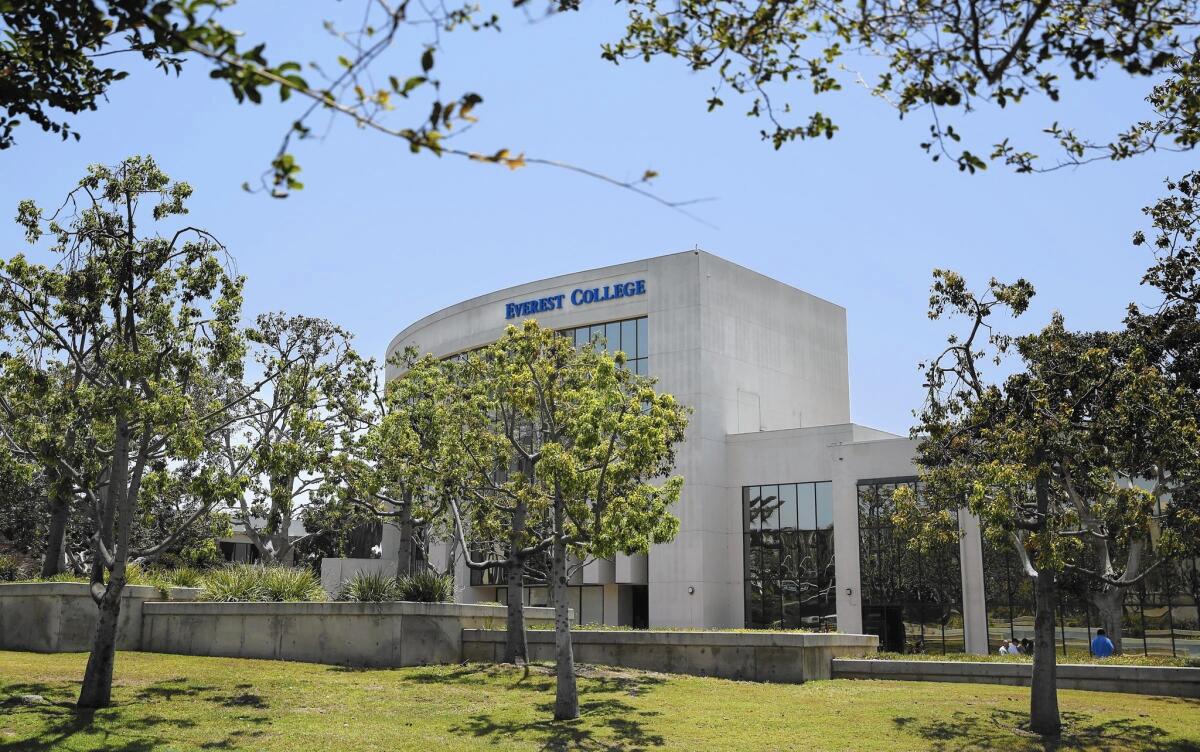Future uncertain for students caught up in Corinthian’s collapse

Tiffany Johnson wishes that she could put Heald College behind her and get a fresh start elsewhere.
But as one of tens of thousands of students caught up in the collapse of Corinthian Colleges Inc., her options are bleak: Continue pursuing what she believes will be a worthless credential, or drop out with nearly $26,000 in debt.
“I feel like I’m just stuck,” said Johnson, 26, a medical assisting student at Heald College-Hayward in the East Bay. “I have no choice. I’m going to have to finish.”
Orange County-based Corinthian Colleges is preparing to sell off the bulk of its schools amid federal and state investigations. Meanwhile, students at 85 schools across the country have been in a months-long limbo as the for-profit college company and the U.S. Department of Education sought buyers who could ensure a proper transition.
Corinthian and the Education Department announced a deal last week that would allow a nonprofit student loan servicer to purchase 56 of the company’s schools for $24 million. Corinthian is still looking to sell more than two dozen other schools, most of which are in California.
Many students say they would prefer to start over and have their loans forgiven. Advocacy groups question why the Education Department hasn’t given students such an option.
“In this entire process, students have had very, very little to say about what happens to them,” said Robyn Smith, a former deputy attorney general in California who now works with the National Consumer Law Center. “I’m sure there are quite a few students who want to finish and continue, but quite a few other students don’t want to continue at a company that is offering a questionable education.”
In a statement, Corinthian spokesman Kent Jenkins said the company has worked “closely and effectively” with the Education Department. “Our schools have continued to serve our students well and without disruption,” he added.
Mushtaq Gunja, chief of staff to the undersecretary at the Education Department, said the department was concerned that giving students a loan discharge option would have made it difficult to find a buyer. He said the department estimated potential liabilities of more than $600 million if all students chose forgiveness.
In addition, if the department hadn’t stepped in to provide a transition, he said many students could have been forced out of college before completing their education.
“Those students would have their education and career goals yanked from them,” Gunja said.
The arrangement between the Education Department and Corinthian grew out of concerns that the company had been falsifying job placement rates and other academic data to remain accredited. The Education Department in June suspended Corinthian’s access to federal student aid — nearly 90% of the company’s revenue.
That put Corinthian into a cash crunch, leading to a July agreement that the company would sell off 85 of its schools and wind down operations at 12 others. The Education Department has continued to keep Corinthian afloat since then.
Only a small fraction of students had the option to get their loans forgiven — those that enrolled during a two-week period before the July agreement was announced. The rest of the students have continued to pursue degrees, and will continue under ECMC Group, the nonprofit loan servicer that bought a large portfolio of Corinthian’s schools last week.
Corinthian operates under the Everest College, WyoTech and Heald brands.
Students like Jeffrey Holman of Indiana, who is pursuing an online bachelor’s degree in computer information science at Everest, feel trapped.
“They made it look like they just did everybody a big huge favor,” said Holman, 52. “But I still don’t understand the favor they’ve done. We didn’t get the chance to choose our future.”
Since July, Holman said he has yet to get a straight answer from Corinthian employees about the agreement with the Education Department.
He got a few boilerplate disclosures in an email. When he followed up by phone, Holman said employees told him there was nothing to worry about: It was just a routine paperwork issue with the federal government.
Since the summer, Holman said, the quality of the education has gone downhill. During one week, students had no instructor for one of the classes. Delivery of textbooks has been disrupted, he said.
Holman had worked as a tree trimmer until he got injured in 2007, limiting his employment options. He decided to enroll in an associate’s degree program at Everest in 2010. He re-enrolled in a bachelor’s program in 2012, believing that the expense was worth the salary he’d make after graduation.
Now he believes it was worth nothing.
“I can’t even look at myself in the mirror in the morning, because I feel like a damn fool,” Holman said.
Student advocates have argued that the Education Department has ceded too much authority to Corinthian. The company is allowed to continue recruiting students, and is in charge of communicating its financial situation to students.
“They have every financial incentive to do whatever it takes to keep students in the school,” said Maggie Thompson, a campaign manager for the Center for American Progress who runs a program centered around student debt issues. “That’s one of the larger problems with this.”
Liann Early, who lives in Lancaster and has been taking online paralegal and business classes since May, said she feels as if Corinthian employees are operating on a script, never directly answering questions about the company’s future.
“It’s like I’m wasting my time with them,” said Early, 50. “And I’m too old to keep wasting my time.”
Going forward, nearly 40,000 students at 56 schools will be transferred to ECMC Group, which has no experience running higher education institutions.
Gunja said the Education Department is pleased that ECMC has pledged to reduce tuition and stop enrolling students in programs where there isn’t local demand for such jobs.
“That’s how these career programs should work,” he said. “There should be a determination that’s made that the certificate you get will get you a job. That is not what’s happening with some of the institutions in the for-profit industry right now.”
ECMC has also pledged to replace Corinthian’s senior management team. That hasn’t given students much confidence.
“When other people start taking over, it gets crazy,” Early said. “The problem I’m having is if I go forward, is it going to be a legit degree?”
Twitter: @c_kirkham







